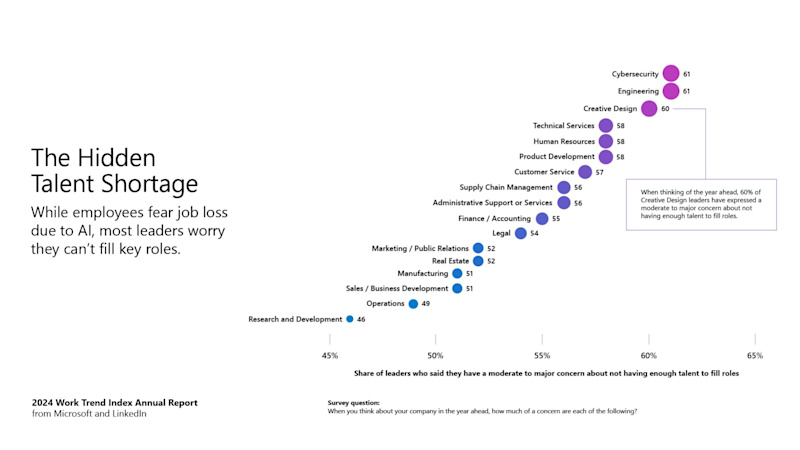As AI use surges ahead, leaders who have explored the tools see its potential as transformational, akin to the shift from a typewriter to a computer. This inspires a new wave of possibilities for employees and organisations.
Looking at one's professional career, AI pushes the envelope. It's not about replacing jobs, but about adapting them. For others, AI helps break barriers.
Some organisations are beginning to look for skills gaps and ‘adjacencies'—related skills that can be easily transferred. For example, Erik Brynjolfsson, Professor at the Stanford Institute for Human-Centred AI shares:
“Believe it or not, if you take a forensic accountant and teach them some cyber, they can become a cyber security expert.”
In an interview with the World Economic Forum, he explains that:
“There's a lot of skill overlap in those two professions, even though you wouldn't have thought of it without looking at the underlying data.”
Using AI, Brynjolfsson and his Stanford Digital Economy Lab colleagues are reviewing large volumes of job postings. Their goal is to identify these gaps and 'adjacencies'. This information is crucial for companies to retrain team members and meet the demands of the future of work.
Businesses need to perform a similar review. They should examine roles that require specialist tech skills, identify people with the expertise to fill them 80%-90% of the way, and then train or retrain teams through relevant programs like Microsoft AI courses while shaping policies around the use of AI.
Some are already getting started with planning for how to implement AI in business. According to the 2024 Work Trend Index Annual Report from Microsoft and LinkedIn:
41% of these leaders expect to overhaul their business processes, with AI considerations, within the next five years.
38% anticipate orchestrating and managing a team of AI bots.
42% say they will be training a team of AI bots.
47% say implementing responsible AI policies and practices will be a core part of their role.
Evolving with the job market through AI training
With conversations on AI come questions about job losses. These are at the top of many professionals' minds. But the data offers a more nuanced view—one with a hidden talent shortage, employees itching for a career change and an opening for those willing to skill up on AI.
Leaders hinted at a hidden talent shortage in the 2024 Work Trend Index Annual Report from Microsoft and LinkedIn. They shared how they are looking for talent with end-user AI aptitude—the skills to use generative AI tools like ChatGPT and Copilot.
55% or the majority (55%) of leaders say they’re concerned about having enough talent to fill roles in the year ahead. These leaders span functions.
60% or higher of leaders in cyber security, engineering and creative design expressed a similar sentiment,
66% of leaders say they wouldn’t hire someone without AI skills.
71% say they’d hire a less experienced candidate with AI skills instead of a more experienced candidate without them.
77% of leaders say, with AI, early-in-career talent will be given greater responsibilities.
This gives junior candidates, career starters and career changers a new edge.
As the competition for AI skills heats up and funding expands, organisations seek proactive AI leaders to drive their initiatives.
In this context, AI leadership involves forward-thinking individuals whose enterprise-wide AI strategy aligns with business goals. They are capable of reimagining business models and consistently generating business value..
What Defines an AI Leader?
IDC's Business Value of AI Survey states that those in charge of AI and leadership should enforce responsible AI principles through established rules, policies and processes.
Security breaches and exposure of customer data are top concerns, and responsible AI policies are designed to mitigate these risks.
Key practices recommended by IDC for how to implement AI in your business and how to realise its significant business value include:
Establish an AI Council: Form a council of senior executives to guide AI adoption.
Develop Responsible AI Policies: Create responsible AI policies that ensure ethical AI use.
Reskill and Upskill Employees: Provide AI knowledge and training to the workforce through Microsoft Generative AI courses and Microsoft Azure AI training.
Allocate Sufficient Budget: Ensure adequate funding for AI initiatives.
Collaborate with Technology Suppliers: Work with suppliers to optimise AI lifecycle costs.
Identify AI Projects: Choose and initiate projects that align with business objectives.
Regardless of their current job titles, look for people on your team who are proactive about maximising organisational efficiency. Potential AI leaders will strongly emphasise data and skills readiness and be open to exploring AI governance and optimised technology usage.
Explore Microsoft AI training with Lumify Work
Reskilling and upskilling employees in AI is not just crucial, it's exciting for any organisation looking to thrive in the AI era. The potential of AI is vast, and with the right training, your team can be at the forefront of this transformative technology.
Lumify Work has been delivering practical training on Microsoft products for over 30 years. As Australia's and New Zealand's first and largest Microsoft Gold Learning Solutions Partner. Lumify offers courses that are also delivered in the Philippines. Our team adheres to the Microsoft Official Curriculum (MOC), which is led by Microsoft Certified Trainers.
We're thrilled to announce that Lumify Work has been honoured with the Microsoft MCT Superstars Award for FY24. This is a testament to the high quality of our Microsoft Certified Trainers (MCTs) across Australia and New Zealand.
In addition, Lumify Work boasts ten fully equipped training campuses with 60 classrooms in key business centres across Australasia We offer both on-premises training and state-of-the-art remote instructor-led training, providing a virtual classroom experience with full HD video and audio, connecting learners with expert instructors.
Explore relevant programs from Microsoft Generative AI courses to Microsoft Azure AI training:
Microsoft AI-3016 - Develop Copilots with Azure AI Studio
Learn how to build generative AI applications like custom Copilots that use language models and prompt flow to provide value to your users.
Microsoft AI-102T00 - Designing and Implementing a Microsoft Azure AI Solution
This course is intended for software developers who want to build AI-infused applications that leverage Azure AI Services, Azure AI Search, and Azure OpenAI. The course will use C# or Python as the programming language.
Microsoft MS-4004/4005 - Empower the Workforce with Copilot and Understand Prompt Engineering
Discover ways to craft effective and contextual prompts for Microsoft 365 Copilot. This course covers real-world scenarios and examples using Copilot in Microsoft 365 apps like Word, Excel, PowerPoint, Teams, Outlook, OneNote, and Chat.
Microsoft MS-4007 - Microsoft 365 Copilot User Enablement Specialist
Learn how to drive adoption of Microsoft 365 Copilot using the Microsoft 365 adoption framework to create and implement a robust adoption plan.
Microsoft AZ-104T00 - Microsoft Azure Administrator
This four-day course teaches IT Professionals how to manage their Azure subscriptions, secure identities, administer the infrastructure, configure virtual networking and more.
As AI continues to transform industries, organisations must adapt by hiring and training talent proficient in AI technologies.
For more information, access Lumify Work's Data Analytics & AI eBook or enquire about our Data Analytics & AI courses and training paths.







